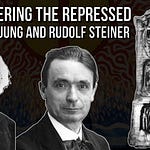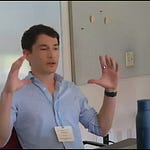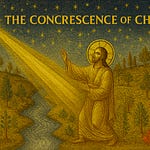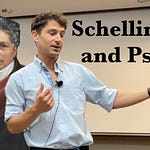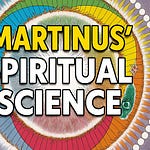My discussion with Jonathan Cobb about his book Logos and Liberation: The Path of Kenosis (2024).
Jonathan, who is the grandson of the process theologian John B. Cobb, Jr (who recently died at 99 years old, and whose memorial was held over the weekend), explained that his book is the culmination of years spent exploring how transformative experiences, such as his awakening during the Occupy movement, reshaped his understanding of society. This awakening not only propelled him into radical politics and activism but also stirred a deep spiritual conversion. Amid the turbulence of protests and his own personal trials—notably, the painful witnessing of his mother’s dignified surrender to terminal illness—Jonathan discovered what he describes as a process of kenosis, or self-emptying, a concept that has come to embody his vision of liberatory politics intertwined with spiritual renewal.
Jonathan recounts how his early intellectual life was marked by a flirtation with libertarianism and scientific pantheism, later enriched by explorations into psychedelics and diverse expressions of Christianity—from Gnosticism to the mystical strains of Kabbalah. These experiments, coupled with a growing disillusionment with purely individualistic modes of thought, led him gradually toward a more communal and politically engaged spirituality. His eventual embrace of a form of Catholicism—one heavily influenced by liberation theology and figures like Oscar Romero—reflects his belief that true Christianity must champion the cause of the oppressed and challenge systems of domination rather than merely offering personal salvation.
Jonathan emphasizes that the quest for spiritual betterment cannot be separated from the struggle against political and economic injustice. He critiques the reductionist approaches of contemporary thinkers who dismiss transformative change as mere self-help, arguing instead for a synthesis in which the pursuit of individual enlightenment and the demand for collective liberation are mutually reinforcing. He explains that the “false Logos”—the idolatrous worship of power that has historically underpinned hierarchical orders, from divine kingship in ancient times to the modern capitalist market—must be supplanted by modeling divine kenosis. In this vision, power is not hoarded but shared, mirroring the organic, cooperative processes observed in nature and traditional forms of craftsmanship.
Jonathan contrasts early egalitarian communities with the later rise of centralized, hierarchical civilizations that built monumental structures to legitimize despotic rule. He traces the evolution from the decentralized, mutually supportive guilds and communes of medieval Europe to the competitive, growth-driven imperatives of industrial capitalism, which were powered by fossil fuels and marked by the commodification of nearly every aspect of life. In his view, capitalism’s relentless drive to appropriate the commons—the natural environment, cultural knowledge, and social bonds—creates a tension that is both its strength and its undoing. Drawing on ideas from scholars like Eleanor Ostrom, he suggests that genuine democracy must be rooted in local, participatory decision-making processes rather than in the abstract notion of “voting with our dollars.”
As the conversation turned to the present, Jonathan spoke with a cautious yet hopeful urgency. He envisions an “apocalyptic faith” not as resignation to an inevitable end but as an active, transformative stance that recognizes the latent potential for societal rebirth. This perspective is undergirded by his belief that while the current system appears to be in free fall—witnessing the excesses of capital and the erosion of communal life—it also creates a rupture through which a more just, community-oriented order might emerge. In his eyes, reclaiming the commons is both a practical and a spiritual imperative; it is a means of rediscovering our interdependence, of nurturing creativity, and of building a future that values human connection over profit.
My Foreword to Jonathan’s book:
In our fragmented and disconnected times, it is rare to find a heart-mind courageous and radical enough to argue that religious, scientific, and political renewal are all interconnected. In this book, Jonathan Cobb attempts to weave the world back together guided by the light of the incarnating Word.
Cobb’s book begins with the Biblical account of creation in Genesis, which he reads as a mythic metaphor for what science now understands to be an evolutionary universe. I am reminded of Owen Barfield’s remark in Saving the Appearances (Middletown, CT: Wesleyan University Press, 1957/1988) that posterity will wonder why it took modern Western civilization so long to recognize “that it had, on the one hand, a religion which differed from all others in its acceptance of time...[and] on the other hand, a picture in its mind of the history of the earth and man as an evolutionary process [without supposing] any connection whatever between the two” (167). Pierre Teilhard de Chardin and Alfred North Whitehead, both inspirations to Cobb, also intuited deeper resonances between the Biblical mythos and evolutionary science.
For Christians, it is the person and deed of Jesus Christ that transfigures myth into history, symbol and metaphor into flesh and blood. But Cobb’s book is not narrowly advocating for a single religious doctrine. Rather, he argues that the Logos is a transreligious cosmic and societal organizing principle that shows up in all the world’s great wisdom traditions, even if by other names (such as Tao, Dharma, Ma’at, Om, or Asha). Whether we are engaged in the scientific study of nature, ritual communion with the sacred, creative expression through beautiful works of art, or active resistance to political injustice, we are making vessels of ourselves for Logos to transfigure the world.
Apocalypse is an event within the soul, and is not simply a disaster—it is also an unveiling. Since Paul of Tarsus’ ministry and John of Patmos’ penning of Revelation, there has never been a generation of Christians that failed to imagine its own times as the end times. This is hardly surprising, since empires have risen and fallen before. But our nascent planetary civilization, still ruled over by Mammon, may be uniquely poised at the edge of self-annihilation. The megamachine of modern techno-industrial capitalism has seized powers on par with super volcanoes and meteorite impacts. Humanity now has the ability to destroy itself along with much of the community of life on Earth in a matter of minutes. And even if nuclear war does not break out in the coming years, our business-as-usual economy of exploitation has already declared total war on people and planet by seeking to maximize ROI above all other values, undermining Earth’s life support systems in the process. The worsening ecological catastrophe is not incidentally related to the social catastrophes of nationalism, materialism, alienation and nihilism. All are symptoms of a lack of attunement to Logos.
Logos is not, in Cobb’s vision, a coercive order imposed from without. Logos is rather a kenotic or self-emptying activity, a creative-relational interplay otherwise known as Love. We know we are in its presence whenever we join in free association with others to build a wiser and more compassionate future together. Logos and Liberation is a prayer for this future. Cobb remains hopeful without being naïve, fired by faith in the human spirit that we might remember amidst all our frailty and fallenness that we are made in the image of a Creator, and that we and the world can be saved. “The good of the Universe cannot lie in indefinite postponement,” as Whitehead said in Adventures of Ideas (New York: The Free Press, 1933/1967).
“The Day of Judgment is an important notion: but that Day is always with us. […] The effect of the present on the future is the business of morals. And yet the separation is not so easy. For the inevitable anticipation adds to the present a qualitative element which profoundly affects its whole qualitative harmony” (269).
Small or large, the acts of faith and love we perform in the present feed the growth of Spirit in the world, granting Logos ever more intimate passage into the flesh, blood, breath, and bone of everyday life. Political revolution, if unaccompanied by spiritual transformation at the level of individual souls and the loving communities they form, is likely to amount to little more than the spinning of wheels, replacing one dominator hierarchy with another. We cannot expect to build a just eco-social order out of foolish and selfish people, such as we know ourselves to be. We might do well to consider how the lilies grow. They do not spin, nor toil, but delight in the gifts of sunlight and soil, celebrating the splendor of creation while still groaning in expectation that we might learn to do the same.






